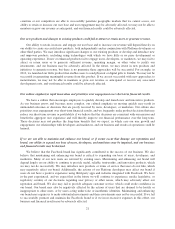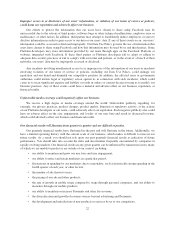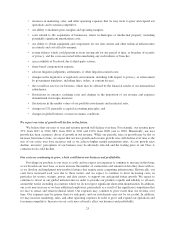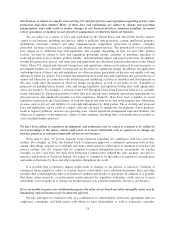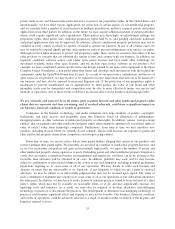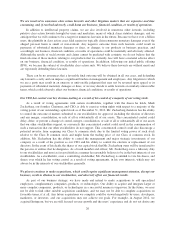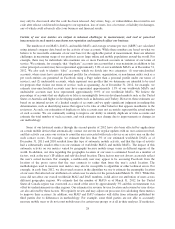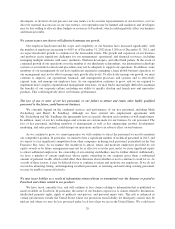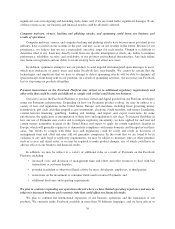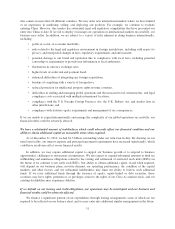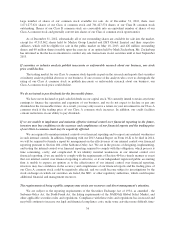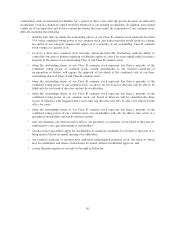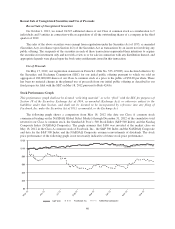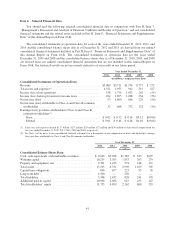Facebook 2012 Annual Report Download - page 35
Download and view the complete annual report
Please find page 35 of the 2012 Facebook annual report below. You can navigate through the pages in the report by either clicking on the pages listed below, or by using the keyword search tool below to find specific information within the annual report.data centers in more than 20 different countries. We may enter new international markets where we have limited
or no experience in marketing, selling, and deploying our products. For example, we continue to evaluate
entering China. However, this market has substantial legal and regulatory complexities that have prevented our
entry into China to date. If we fail to deploy or manage our operations in international markets successfully, our
business may suffer. In addition, we are subject to a variety of risks inherent in doing business internationally,
including:
• political, social, or economic instability;
• risks related to the legal and regulatory environment in foreign jurisdictions, including with respect to
privacy, and unexpected changes in laws, regulatory requirements, and enforcement;
• potential damage to our brand and reputation due to compliance with local laws, including potential
censorship or requirements to provide user information to local authorities;
• fluctuations in currency exchange rates;
• higher levels of credit risk and payment fraud;
• enhanced difficulties of integrating any foreign acquisitions;
• burdens of complying with a variety of foreign laws;
• reduced protection for intellectual property rights in some countries;
• difficulties in staffing and managing global operations and the increased travel, infrastructure, and legal
compliance costs associated with multiple international locations;
• compliance with the U.S. Foreign Corrupt Practices Act, the U.K. Bribery Act, and similar laws in
other jurisdictions; and
• compliance with statutory equity requirements and management of tax consequences.
If we are unable to expand internationally and manage the complexity of our global operations successfully, our
financial results could be adversely affected.
We have a substantial amount of indebtedness which could adversely affect our financial condition and our
ability to obtain additional capital on reasonable terms when required.
As of December 31, 2012, we had $1.5 billion outstanding under our term loan facility. By drawing on our
term loan facility, our interest expense and principal repayment requirements have increased significantly, which
could have an adverse effect on our financial results.
In addition, we may require additional capital to support our business growth or to respond to business
opportunities, challenges or unforeseen circumstances. We also expect to expend substantial amounts to fund tax
withholding and remittance obligations related to the vesting and settlement of restricted stock units (RSUs) in
the future if we continue to net settle such RSUs. Our ability to obtain additional capital, if and when required,
will depend on our business plans, investor demand, our operating performance, the condition of the capital
markets, and other factors, and our substantial indebtedness may limit our ability to borrow such additional
funds. If we raise additional funds through the issuance of equity, equity-linked or debt securities, those
securities may have rights, preferences, or privileges senior to the rights of our Class A common stock, and our
existing stockholders may experience dilution.
If we default on our leasing and credit obligations, our operations may be interrupted and our business and
financial results could be adversely affected.
We finance a significant portion of our expenditures through leasing arrangements, some of which are not
required to be reflected on our balance sheet, and we may enter into additional similar arrangements in the future.
31


